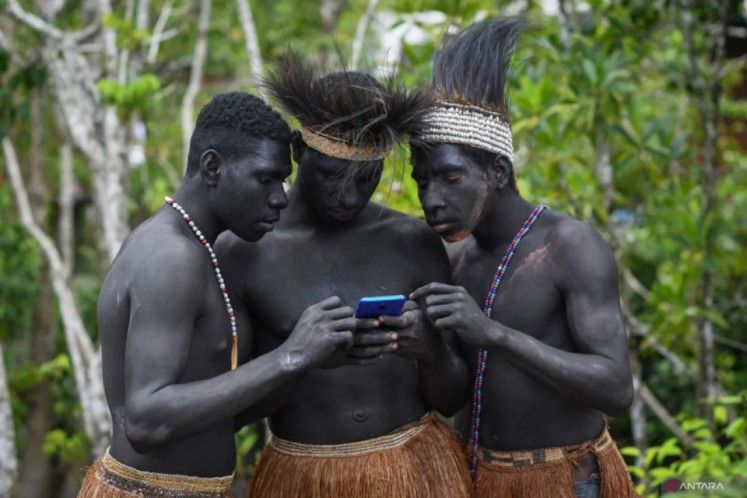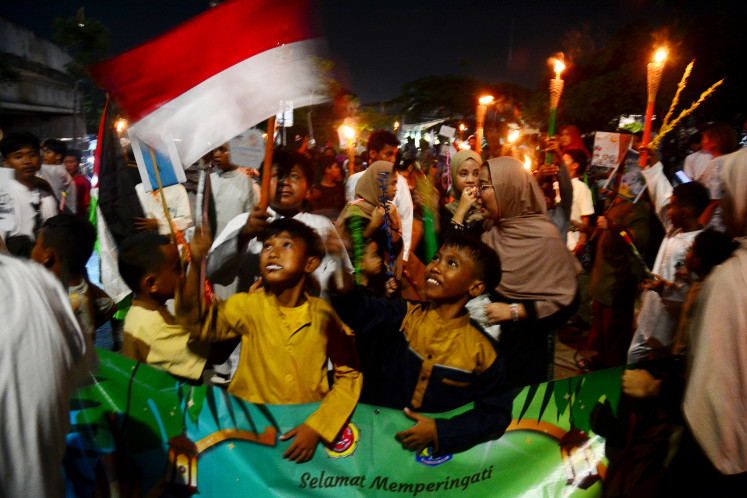Popular Reads
Top Results
Can't find what you're looking for?
View all search resultsPopular Reads
Top Results
Can't find what you're looking for?
View all search resultsNavigating religious harmony in the age of social media
Nearly 30 percent of Indonesians, especially Gen Z and Millennial cohorts, now access religious knowledge primarily through digital platforms, including social media, streaming sermons and online preachers.
Change text size
Gift Premium Articles
to Anyone
 Residents take tajil food distributed for breaking the fast by a committee from the Dharma Bhakti Temple in Petak Sembilan, Glodok, West Jakarta, on March 28, 2023. The Dharma Bhakti Temple distributes hundreds of tajil packages to Muslims during Ramadan. The charity is held annually as an expression of tolerance among religious followers. (Antara/Wahyu Putro A)
Residents take tajil food distributed for breaking the fast by a committee from the Dharma Bhakti Temple in Petak Sembilan, Glodok, West Jakarta, on March 28, 2023. The Dharma Bhakti Temple distributes hundreds of tajil packages to Muslims during Ramadan. The charity is held annually as an expression of tolerance among religious followers. (Antara/Wahyu Putro A)
I
ndonesia's religious harmony has historically been rooted in deeply held values of community, tolerance and shared identity. However, in today's hyperconnected world, this harmony is increasingly shaped and tested by digital spaces. Religious discourse is no longer confined to places of worship, instead, it is mediated through algorithms, viral content and transnational narratives.
To understand this transformation, the concept of glocalization, as developed by sociologist Roland Robertson, provides a valuable framework.
Glocalization describes the simultaneous and interactive processes of globalization and localization. In this view, global trends don't simply override the local, they interact with, reshape and are reshaped by local contexts. In religion, this means faith practices, identities and expressions are no longer formed exclusively in face-to-face communities. They are increasingly shaped through digital encounters that blur the boundaries of geography, culture and authority.
Recent data from the 2024 Landscape of the Radicalism Potential Index (IPR), published by the National Counterterrorism Agency (BNPT), reveals that nearly 30 percent of Indonesians, especially Gen Z and Millennial cohorts, now access religious knowledge primarily through digital platforms. This includes social media, streaming sermons and online preachers.
While this shift opens new possibilities for learning and engagement, it also introduces serious risks, such as exposure to decontextualized ideologies, polarizing content and religious narratives imported from different social and political environments.
The digital sphere has become a new frontier in the struggle for religious understanding and coexistence. Between January and October 2024 alone, BNPT recorded over 10,500 pieces of terrorism-related content circulating across more than 2,200 social media accounts. Much of this content features hate speech, takfiri propaganda and antinational sentiment. These messages are often disconnected from Indonesia’s pluralistic traditions, yet they gain traction in local settings where digital literacy and civic dialogue remain limited.
A tragic manifestation of this tension occurred on June 27, in Tangkil Village, Sukabumi, West Java. A private home used as a Christian retreat space came under attack. 36 children and their mentors had gathered for a peaceful worship activity. However, local residents, provoked by misinformation, vandalized the property, damaged vehicles and religious materials. Seven alleged perpetrators of the attack were later arrested.


















